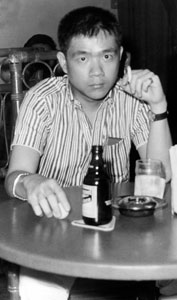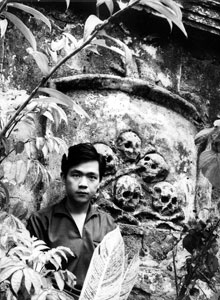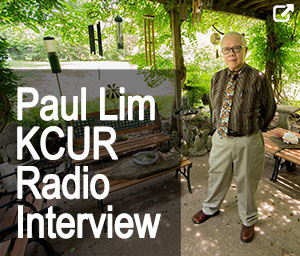On the afternoon of 9 May 2011, the English Department of the University of Kansas gave a festive “milestones celebration” in the North Gallery of the Spencer Research Library for three of its new retirees, presided by Chair Marta Caminero-Santangelo, and organized by Administrative Assistant Robert Elliott. The retirees (Mike Johnson, Jim Hartman and I) were expected to say a few words. Here’s what I prepared for the occasion.
Many, if not most, of the people here know me as, until recently, the one and only person who has been teaching playwriting in the English Department since 1989, the same year I founded English Alternative Theatre to nurture, develop and produce the plays being written by my students. But, my history with the department goes all the way back to spring of 1969, and not many people here know how I came to be at KU, so I thought I might share the story with everyone present.
These days, if I am filled with feelings I cannot begin to describe when I’m watching the hit television series MAD MEN, it’s because I lived through the same exciting period in the 1960s as an advertising copywriter for J. Walter Thompson in the Philippines. Many of the ad campaigns that I worked on had won various industry awards, and my colleagues in Manila thought I was “good enough” to make it on Madison Avenue in New York.
Thus, travelling on just a tourist visa, I left for the United States with my hefty portfolio in June of 1968. To my disappointment, after they looked at my portfolio, the people at J. Walter Thompson in New York said that, ironically, I had too much experience. They were only interested in hiring cheaper, beginning copywriters. They suggested I try my luck with employment agencies, which I did, and they in turn told me that I could lie about my experience and start at $18,000 a year, or else I could sit and wait for a $30,000 job to open up at one of the ad agencies in the city. Not wanting to sell myself short, I chose to wait.
Day after day, I sat by the telephone, waiting. Nothing. Six months went by, and I began to worry, because my tourist visa was running out. I had only two options. I could be deported as an illegal alien, returning to Manila with that damned portfolio, my tail between my legs, or I could exchange my tourist visa for a student visa. And then I remembered that, back in 1964, I had met a peripatetic historian from the University of Kansas, who had been in the Philippines first as a soldier during World War II, then as a Fulbright scholar, then as a frequent visitor in the course of his academic research. Although I did not have any of my college transcripts from Manila with me, I turned to Grant Goodman to convince the registrar at KU to accept me as a foreign student. And, believe it or not, that’s how I ended up in Lawrence, Kansas.
As a side note, two weeks before I left the East Coast for the Midwest, the telephone finally rang, not once, but twice, with lucrative job offers from The Wall Street Journal and from Alka-Seltzer, both of whom were starting their own in-house agencies, and they were interested in someone with my background and qualifications.
Too late.
I had dropped out of school after two years of college in Manila because I was bored with my teachers, but now I felt I was ready to reenter the groves of academe. Had I gone to work for either The Wall Street Journal or Alka-Seltzer in New York, I would not have had the joy of studying with, among many others, Ed Wolfe, Ed Ruhe, Ed Grier, Paul Kendall, John Bush Jones, Jack Oruch, Max Sutton, Hal Orel, Beverly Boyd, George Worth and Jim Hartman. I would not have formed lasting personal friendships with, among others, such wonderful colleagues in the department as Carolyn Doty, Bud Hirsch, Mary Davidson, Mary Catherine Davidson, Jim Carothers, David Bergeron, Geraldo Sousa, Amy Devitt, Dick Hardin, Bill Scott, Bob and Dorice Elliott, Marta Caminero-Santangelo, Brian Daldorph and Phil Wedge.
When Grant Goodman himself retired from the History Department 22 years ago, he let it be known that he did not want to be presented with an autographed 8 x 10 glossy of then-KU Vice-Chancellor for Academic Affairs Judith Ramaley, a position which, incidentally, no longer exists in Strong Hall. I’ve never met our new Provost, so I don’t think there’s any danger of my receiving an autographed 8 x 10 glossy from him. Truthfully, I am quite happy with all the pictures in my mind’s eye, of everyone I’ve named, of everyone here today, to say nothing of all the wonderful student playwrights, actors and designers I’ve been fortunate to work with through English Alternative Theatre, to remind me that the journey has been worthwhile. Indeed, it has all been more than worthwhile.
These days, given the economy, I’m thankful I never got into the habit of reading The Wall Street Journal, so there is no reason for me to imbibe the “plop plop, fizz fizz” of an Alka-Seltzer. Actually, I’ve never in my life ever had an Alka-Seltzer, not even the mornings after the nights of heavy drinking after some of our more memorable and sometimes even deplorable departmental meetings. I hope I live long enough to tell all the steamy stories on my website at paulstephenlim.com.
Thank you for the memories, one and all, everyone. A special thank you, too, to all my friends and colleagues who have given so generously to the KU Endowment Association for the annual Paul Stephen Lim Asian-American Playwriting Award which has been established by the Kennedy Center American College Theatre Festival.













